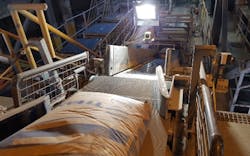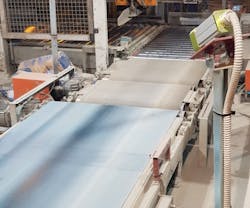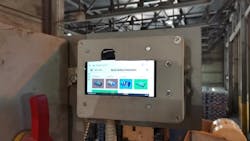Titan Cement Adds Inspection System to Production Facility
Titan Cement (Athens, Greece), a global company that produces cement and building materials for the construction industry, has deployed an automated inspection system at its Patras, Greece, cement manufacturing plant.
Traditionally, at the Patras facility, inspections of these cement sacks were performed by human inspectors working eight hour shifts, 24 hours a day, in harsh conditions, doing manual, in-person inspections. If inspectors found a defect, they had to manually shut down the production line to remove the defective sack(s).
This is an expensive way to solve the problem. An interruption on a cement production line causes delays and reduces efficiency; a few defective cement sacks can spoil entire product pallets, leading to significant extra costs in time and money.
There also were other issues with the manual process. Humans become fatigued or may need to periodically leave the line during the production process. While they are experienced and competent at their jobs, human inspectors have their limits; often just cannot see minute/obscure defects on the bags. And, because the process is labor intensive and generally performed in challenging conditions, inspections performed by humans are error prone, which makes it difficult to capture meaningful QA data.
In late 2021, Titan partnered with Irida Labs (Patras, Greece) to develop and implement an automated inspection system that can inspect cement sacks on a production line. Titan executives wanted a system that identifies defects such as cracks, spills, dents, cuts, damaged edges, and printing errors, as well as sends alerts and takes corrective actions—and do it all 24 hours a day, seven days a week, 365 days a year, under such challenging conditions as variable ambient light, excessive dust, moisture, and vibration.
“The vision system should provide always-on defect detection on continuously running conveyor belts while providing real-time alerts when a defective product is detected,” says Irida Labs’ Thomas Charisis, Product Growth Director, PERCV.ai.
Related Content: German Company Develops AI-Enabled Tire Inspection System
Building a Solution: The Vision System
The inspection system utilizes three Basler (Ahrensburg, Germany) cameras equipped with Basler premium lenses. Housed in IP67-rated custom built housings to protect them from the harsh conditions at the plant, the cameras are mounted on brackets over the production line and synchronized with photocell triggering to perform defect detection on the cement sacks as they come down the line. Two Basler ace 2 USB 3.0 color cameras are deployed for the sole purpose of inspecting the sacks for any physical defects. The third camera, a Basler ace 2 GigE monochrome camera inspects the sacks for printing failures. More specifically, says Charisis, the monochrome camera uses optical character recognition to verify that the data label is positioned correctly within the frame in which it should be printed and to verify that the date on the label is correct.
DC LED lighting is installed on the line near the cameras to overcome challenges presented by the changing ambient light, Charisis says.
Adding AI to the Solution
The cameras are hardwired to an ADLink (San Jose, CA, USA) DLAP-211-JNX edge computer, which is deployed along the line in close proximity to the cameras. The computer analyzes the image data in real time using Vision AI quality inspection modules developed by Irida Labs. These modules are built on Irida Labs’ platform PerCV.ai, which is used to develop specific AI algorithms and manage the deployment of them.
“Image processing is performed at the edge; each camera sensor is paired with an on-site processing device that operates as near as possible to the sensor, making the system an edge AI vision solution,” Charisis says. “The impact of edge processing is instrumental in achieving low latency, real-time defect detection, and alert triggering, as well as privacy-preserving.”
If the system detects a defect, there are several response options, he says. “Initially, there was an alarm going off and the conveyor belt would automatically stop, while a worker would take the defective cement bag off the belt and then re-start the process,” Charisis says.
Later, the team provided the real-time events via MQTT API, a messaging protocol often used in industrial settings for machine-to-machine communication, to a programmable logic controller that triggers a deviation system, which automatically removes the defective sack without stopping the production line, Charisis says.
Related content: Using Deep Learning to Automate Inspection of Medical Carts
Challenges, Solutions, Future Plans
The team overcame challenges during implementation. In fact, one primary technical challenge turned out to be acquiring sufficient training data for the AI modules to recognize all the possible types of defects that could occur with the cement sacks.
“It would have taken an impractical amount of time to physically encounter and capture all potential defect cases in an operational production line,” Charisis says.
To overcome this challenge, the team came up with a solution that leveraged AI-generated synthetic data through the AI platform, which expedited the data acquisition process, Charisis says.
The inspection system, which has now been in operation at the plant for more than two years, has been successful, says Maravas Grigorios, supervisor of grinding, mixing, port & raw materials at Titan’s Patras facility. The system has significantly reduced the number of defective sacks that end up on pallets, Grigorios says.
“As a consequence, customer complaints about defective sacks have significantly decreased,” he notes. And, since human inspectors are no longer needed, the system has provided significant savings in labor costs.
The company plans to deploy the system in more plants in the second half of 2024, however, the exact dates and locations have not yet been finalized, according to Titan and Irida Labs officials.
Related content: Can Quality Assurance Be Trusted Without Off-line Inspection?
About the Author
Jim Tatum
Senior Editor
VSD Senior Editor Jim Tatum has more than 25 years experience in print and digital journalism, covering business/industry/economic development issues, regional and local government/regulatory issues, and more. In 2019, he transitioned from newspapers to business media full time, joining VSD in 2023.



